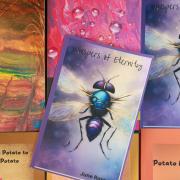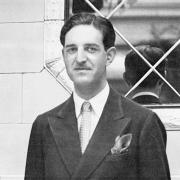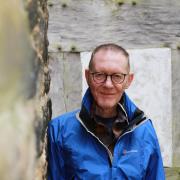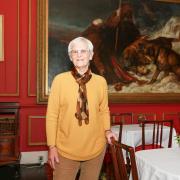Former detective Maggie Oliver exposed flaws in the investigation into child abuse in Rochdale. Now she’s dedicated to helping survivors.

There are moments when Maggie Oliver admits she can't quite believe her life has panned out the way it has. 'I'm shocked and sometimes it's completely overwhelming,' says the Greater Manchester police detective-turned-whistle blower who took on the establishment in order to reveal the flaws she'd witnessed during the Rochdale sex gang investigation. Not only had authorities turned a blind eye to the brutal reality of what was happening, but they'd repeatedly failed the young victims of abuse. These girls, notes Maggie, were deemed 'an underclass', children who were making 'lifestyle choices' and therefore not worthy of the protection they were due.
'I wanted to give a voice to the kids who'd been failed because I'm far more difficult to brush off and ignore than the kids who'd been written off. I'm an educated woman, I have a degree, I was a police officer and I have a voice that will be heard,' says Maggie whose book Survivors: One Brave Detective's Battle to Expose the Rochdale Child Abuse Scandal was recently published. In the autobiography, she not only details her reasons for becoming a police officer, the flawed investigations she witnessed and the ways in which her concerns were dismissed, but how this played out against a backdrop of great personal tragedy.
Writing the book meant revisiting some of the most traumatic times of her life, not only in a professional capacity, but in her personal life too, including the death of her beloved husband Norman and later, their two-year-old granddaughter Macie.
'But I'm really glad I have,' says Maggie. 'I think it was the right thing to do because it's a record of what happened. It's truthful, my kids have got something to read when I'm not here, as have my two little grandsons.

'It's a way to explain how I've come to this place, and why I felt that I had to pretty much give up my life to talk about it the failings. I feel now I can take everything I've learned and move it to the next chapter of my journey.'
That includes the recently launched Maggie Oliver Foundation. Her goal, she says, is to open centres where survivors of abuse can go for counselling, legal advice or simply a listening ear.
'I can't personally hold the hands of everyone who needs help, but I hope my centres will become that place,' says Maggie whose police career didn't take off until she was in her 40s.
Born in Bacup, she devoted many years of her life focusing on her and Norman's four children, but as they grew up, Maggie realised she wanted a career, something to make her own, and made the decision to enrol at university with the intention of teaching.
'Then I thought I've spent the past 15 years of my life with my own children, and other people's children, and perhaps it was a time to look for something different, something that would still give me a sense of achievement and be worthwhile,' she recalls.
'I always wanted to try to make a difference and the police seemed an ideal way for me to do that, to help people and to put the bad guys away. That was my intention and I've no regrets joining the police.'
At the age of 42, she graduated as a police officer and it wasn't long before she was investigating serious crimes.
This included multiple allegations of serious sexual assault on vulnerable white girls by Asian men in and around Manchester, first as part of Operation Augusta, which saw no convictions despite overwhelming evidence, and five years later, as part of Operation Span.
As part of the latter task force, Maggie was tasked with gaining the trust of two sisters at the centre of an investigation involving Asian men abusing girls in Rochdale, a job Maggie only accepted following assurances that Operation Augusta's failings wouldn't be repeated.
In 2012, nine members of a paedophile grooming ring were jailed but Maggie felt the true extent of abuse had not been revealed, nor had the failure to protect the victims and so, pushed to the point of exhaustion, she made the decision to resign from her job in order to speak out publicly with no idea what repercussions she might face.
'I'm not anyone special, I'm just someone who believes as a police officer that I was there to protect the vulnerable and do good and what I saw was the complete antithesis of that. I didn't want to have to give my job up in order to force them to do what was right but ultimately that's what I had to do,' says Maggie.
The investigation was the focus of the BBC drama Three Girls in which Lesley Sharp depicted Maggie and aired to great acclaim in 2017.
'I feel grooming is now understood, that people understand these kids are commodities and there's now an empathy for these kids, not a judgement that they're bad kids doing bad things,' notes Maggie.
Understandably, her trust in Greater Manchester Police and the authorities is 'forever destroyed'.
'I do not trust the establishment any more, and that is from someone who devoted 15 years of their life to upholding what I thought was the law. I had great respect for the police and really believed I was going in there to do what I promised to do in my attestation but what I learnt was that's not always what was required of me,' says Maggie.
'I'm not knocking my colleagues at all because police officers are doing a phenomenal job, sometimes with one hand tied behind their back, and they need support from the top of these organisations and that's where it's lacking. I guess my mission is to continue to expose failures where I see them and my foundation, my charity, is the next step of that journey.'
Of course, she can't achieve her goals unless the public continues to support her.
'I think people know my word is my bond. I promise that the money raised will go towards a centre, initially in Rochdale, but my dream is to have Maggie Oliver centres in towns and cities across the country,' says Maggie who's still in contact with many of the abused girls she's worked with over the years.
'I do have moments where I question whether I should walk away and focus just on my own children and my life because I won't lie, it is a big responsibility. But if I do that, all the lessons I've learned, and all the knowledge I've gleaned from the journey I've taken is lost, and who else is going to do it?'
For more information, go to themaggieoliverfoundation.com.



























